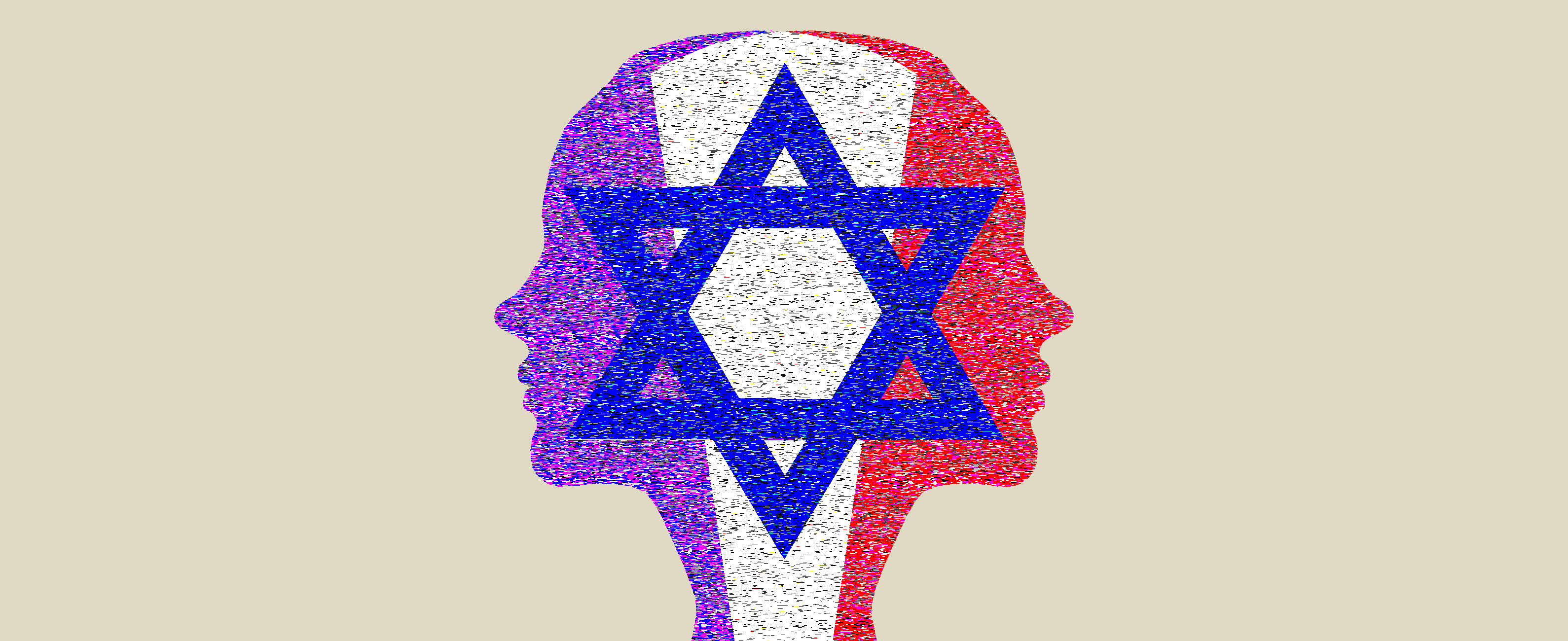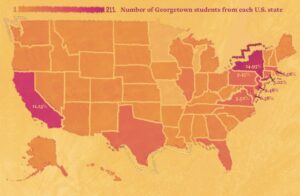Audio: Listen to Annette Hasnas read her piece, “One Foot in the Promised Land.”
This piece appears as part of Carrying On, an ongoing column written by members of the Voice masthead.
I’m Jewish.
Or so I’d like to be able to tell you. But the truth is a little more complicated than that.
These are the facts:
My father is Jewish. Undeniably, unequivocally Jewish. He was raised on Long Island by two temple-going Jews in a kosher-keeping home. He went to Hebrew school; he was bar mitzvahed. He’s Jewish.
My mother is not. She was born to Catholic parents in Miami, the blonde, blue-eyed, fifth of six children.
They met in college, dated for nineteen years, got married, and had me.
Genetically speaking, I am one-half Ashkenazi Jew.
That much is clear cut. There are more facts, of course. Like that I’ve celebrated Christmas every year of my life, along with Hanukkah and Passover. Like that I wasn’t bat mitzvahed, and I can’t read a word of Hebrew. Like that I’ve made too many matzah balls to count, and I have a preferred way of spelling Hanukkah. Like that my great grandparents fled Russia to escape near certain death in antisemitic pogroms.
But with each of these facts, the truth becomes less clear. Because each one of them tells a different story as to whether or not I really am Jewish.
So, am I?
Well, there are a million different metrics by which that could be measured. Judaism is matrilineal, so, to Orthodox Jews, I’m most certainly a Gentile. But I have undeniable Jewish blood, so the Auschwitz guards would have awaited me with open arms, and the Russian pogroms my great-grandparents fled would certainly not have passed me over. I have a Jew in my immediate family, so Israel would offer me citizenship, should I ever seek it, but the government wouldn’t count me as a “Jew.” Any criterion you could name that would point to one answer, I could give you at least as many pointing to the other. It’s paradoxical and confusing, and none of it does anything to answer my question.
What, then, makes someone Jewish? Is it the way they’re perceived? For one to claim entrance into an ethnic group, must the world look at them and judge them to be a member? Because if that’s the case, I’ve found my answer.
My last name is not a Jewish one. Due to a mix up with the paperwork when my family left Russia for Romania (or so the family story goes), my last name is Hasnas, which is Romanian. I’m not a Greenburg or a Bluestein, like my grandmother was before she married, or a Sadovnik, like my cousins were before changing their name to escape antisemitic medical school admissions. I’m a Hasnas. And Hasnas isn’t Jewish.
And you can’t look at me and tell. I don’t wear a star of David around my neck. I have none of the stereotypically Jewish features, no physical hallmarks of Jewishness. None of my family does—my paternal grandfather was as blonde as my mother (reportedly; I never saw him before he went gray).
So people don’t catch my Jewishness. People are surprised when it comes up.
Until corrected, nobody sees me as such. This makes me lucky, I suppose. Passing for “Aryan” has, in all likelihood, had a real impact on my experience of life. This ability to pass isn’t nothing—not just a matter of my hair texture or facial structure. So maybe I’m not Jewish.
And besides, I’m not religious. I believe in no higher power. I never pray, and, like my father, I never have. I don’t believe in the burning bush, or that Moses parted the Red Sea. I don’t think that matzah—delicious though it may be—was created when biblical Jews were left no time to allow their bread to rise before fleeing Egypt after God sent forth ten plagues. At my cousin’s wedding—a cousin on my mother’s side, not Jewish but marrying a religious Jewish man—all the rabbi’s talk of God inspired nothing in me but boredom. Judaism is a religion, isn’t it? And I’m not religious.
And, of course, the matrilineality makes a difference. Jews are the Chosen People, a bloodline, and no matter how certain you may be that your father’s blood really does flow through your veins, it’s never certain enough to please God. And my mother isn’t Jewish. So maybe I’m not a Jew.
But, that doesn’t seem quite right. After all, I feel Jewish.
And why shouldn’t I? I take part in traditions—as many traditions as my Jewish friends, or as my Jewish father (it was at MY insistence that we had a seder for Passover this year, not my dad’s). I eat latkes and charoset, lightly salted matzah has been my designated snack during late nights gaming with friends, and I could make a matzah ball with my eyes closed. I have those experiences; they’re a part of me, a part of who I am, memories I treasure deeply, and no matter how un-Jewish my mother may be, nothing can take them away from me.
Besides, what about the oppression—the persecution my family has faced for their entire history, or the personal nature of the pain I feel when neo-Nazis and synagogue shootings are on the news? What about the deep-seated lack of trust in dominant religions and strict power structures drilled into me my whole life by a father to whom a Christian cross was a symbol of hostility? These things are all real, and they, too, are parts of me. Am I just supposed to forget them? If the ruling is made and the verdict comes back as “not Jewish,” how do I reconcile with those parts of myself? With the fact that Holocaust history is about my relatives? The fact that my great-grandfather was made to work shoveling horse shit after being drafted into WWI because “no better job was fit for a Jew”? The fact that my great-aunt rarely spoke in her adult life after, when she was five, her father was cut down as he led her out of their Yiddish-speaking village during a Russian pogrom, so that she was left clutching nothing more than his disembodied hand? If I’m a non-Jew, permitted only to lay claim to the part of my heritage that casts me as a typical white American, descendant of Western Europeans, how can I possibly make sense of these facts?
So maybe I am Jewish. And yet, that doesn’t seem right either.
It should be. I want it to be. I say it sometimes; when questioned, I tend to tell people I’m Jewish, more or less. But every time there’s this little voice, one that tells me I’m lying. One that compels me to explain, to tell them I’m not really Jewish. One that warns me that if I don’t, somehow, they’ll find out that I’m a fraud, that I’m faking it, that I’m deceiving them.
So to shut it up, I try to prove it.
I try to show the world that no, I am Jewish, I must be. I put up a front that seems to dare them to deny it. I’ve decided to keep kosher, though I was never raised to. I’ve decided to learn Yiddish, which my family once spoke but my dad never quite picked up. Because if I can do those things, if I can project those Jewish-isms, superficial though they may be, who could challenge me? Who could look me in the eyes and tell me I’m not Jewish enough?
Part of me wants to convert. In fact, a lot of me wants to convert. After all, surely that would prove it definitively. But the idea feels cheap to me—fake—like I’d be slipping through a loophole, lying to the rabbi. Because the fact of it is, no matter what, I’m not religious, and I don’t plan to be. I don’t want to go to regular religious ceremonies; I have no desire to honor God through my actions. And I can’t escape the feeling that to convert like that, to convert knowing that I will never be what the religion would want me to be—that I’ll never even try—would be dishonest.
Of course, there are plenty of Jews with no more connection to the religion of their people than I have. There are plenty of Jews with less.
Talking to people who can confidently call themselves Jewish despite being no more practicing than myself, I feel almost like an immigrant, like someone seeking citizenship in my own ethnic group. I feel like I’m facing a citizenship test, one which asks me to recite history and civics trivia, which requires I recite the presidents in order, despite the fact that few natural-born citizens could. In this sense, the hurdle is higher—I don’t just need to be as Jewish as some schmuck who was lucky enough to be born into it; I need to be more. I need to prove that I really want to be there—that I really deserve it. I need to go to synagogue, which my father doesn’t do; I need to believe in the stories of the Torah, which none of my friends do; I need to have faith in the proper God, which even my most Jewish friend (who spends most of his time with his Jewish youth group and plans to spend all of next year in Israel) isn’t quite sure he does. But they were all born Jewish, unequivocally Jewish, so none of these things matter. I was born in between, so to me, they do.
But if I can’t be fully Jewish, what can I do? Must I stay forever in this foggy, halfway state? Must I live my life correcting myself, tempering my professions of my own identity for fear that they will be revealed to be lies? And what of my children? I plan to raise them as I was raised, with chocolate coins all eight days of Hanukkah, with the taste of salt water and bitter herbs familiar on their tongues, with the motion of a dreidel spin set as muscle memory in their fingers. What happens when they are old enough to care, old enough to worry about these things, and find themselves feeling Jewish, as I do, but with, by all odds, only one-fourth Jewish blood running through them, not even the full half that I have? Have I no choice but to pass my own identity crisis to my children like some sort of genetic disease or some family curse, to send it forward through the generations, hanging always over the heads of each new baby born?
I don’t have the answers. I probably never will. There will probably never be a day when I wake up, look in the mirror, and see the face of a Jew or a non-Jew. The face will always be just a little bit of both, somewhere in between. I can talk to Georgetown’s Director of Jewish Life, I can investigate my family history, I can travel to Israel, I can keep kosher, I can learn Yiddish, but it won’t change anything. As much as I try, as hard as I search for answers, for someone who will tell me, once and for all, that I’m Jewish, for something that will make me believe it, I know that I will never find them. I’ll come to terms with the struggle, I hope, but it’ll never quite go away.
So maybe one day I’ll convert, even if I can’t imagine doing so without being disingenuous now. But until then, that voice is still there, reminding me that I’m not quite Jewish enough, that I never truly have been. Until then, I scrape by, I make ceremonial gestures, I cling to my family’s history, and I hope for the day when “I’m Jewish” doesn’t sound like a lie.





